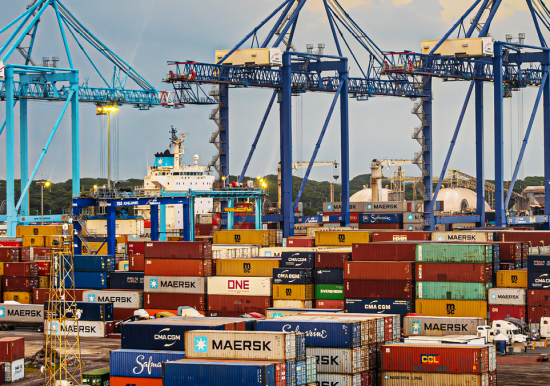
Strong Institutions Country Snapshot: Indonesia

With more than 275 million inhabitants, Indonesia is the fourth most populous country in the world. Delivering public services across the 5,000 km‑long archipelago of more than 17,000 islands tests the nation’s different levels of government. Since 2001, a decentralisation drive has led to better developmental outcomes, with greater fiscal autonomy at the local government level linked to greater administrative productivity, albeit with some disparities.1
Indonesia’s government operates according to a unique system of Coordinating Ministries—specialised bodies tasked with synchronising and streamlining efforts across various ministries, ensuring that policies are implemented effectively and in alignment with the country’s development agenda.2 Of the 48 ministers in the current cabinet, seven are Coordinating Ministers.
Greater institutional and political stability and policy coordination in recent years have facilitated steady advances in Indonesia’s public administration capabilities. In 2020, during the COVID‑19 pandemic, the government launched a National Economic Recovery (PEN) programme—a coordinated economic stimulus response balancing health, social protection, and economic support that has been widely credited with accelerating the country’s post‑pandemic economic recovery.3
Indonesia has also ramped up its data capabilities, improving its information and communications technology (ICT) infrastructure, and expanding digital literacy programmes.4 Mandated in 2019, the One Data Policy, also known as Satu Data Indonesia, is a government initiative to standardise data across all ministries and agencies, ensuring that data is accurate, up‑to‑date, integrated, accessible, and shareable between central and regional government levels. The ultimate aim is to improve policy‑making through quality data access and interoperability.5
In 2024, the government also launched INA Digital as an initiative to integrate its diverse government digital applications and services into a single portal,6 beginning with three main services introduced at the end of 2024: the INA Ku public service portal, the INA Gov government administration portal, and the INA Pas digital ID sign‑on service.7
Advances in government digital and data capabilities demand a capable and digitally literate public service. The Indonesian Ministry of Communication and Digital Affairs (Komdigi) and the Ministry of State Apparatus and Bureaucratic Reform have been cooperating to drive the government’s digital transformation,8 with ongoing reforms in recruitment, training, and professional development to improve the quality of the bureaucracy. The government has committed to training and capacity‑building programmes for civil servants to enhance their digital skills.9 The National Civil Service Agency (BKN), responsible for overseeing recruitment and career development for civil servants, also increasingly recognises merit in practice.10

A sterling test of Indonesia’s government coordination is the relocation, currently underway, of its state capital from the city of Jakarta on Java island to the planned city of Nusantara in East Kalimantan on the island of Borneo.12 The move, announced in 2019, is likely to take several years.
Endnotes
- Negara, S. D. & Hutchinson, F. E. (2021). The Impact of Indonesia’s Decentralization Reforms Two Decades On. Journal of Southeast Asian Economies. https://bookshop.iseas.edu.sg/component/get/21907
- For example, the Coordinating Ministry for Economic Affairs coordinates seven ministries and agencies such as those for Manpower, Trade, Industry, and Energy and Mineral Resources. (See: https://www.aseanbriefing.com/news/the-red-and-white-cabinet-strategic-continuity-and-ambition-in-prabowos-indonesia/
- The Jakarta Post. (18 October 2024). Accelerating post pandemic economic rebound through the PEN program. https://www.thejakartapost.com/business/2024/10/18/accelerating-post-pandemic-economic-rebound-through-the-pen-program.html
- United Nations E-Government Knowledgebase (UNEgovKB).(2024). UN E-Government Survey 2024. https://publicadministration.un.org/egovkb/en-us/Reports/UN-EGovernment-Survey-2024
- UN Economic and Social Commission for Asia and the Pacific. (n.d.) Indonesia: Data governance profile. https://www.unescap.org/sites/default/d8files/event-documents/Indonesia-data-governance-profile.pdf
- Indonesia’s government digital services consist of some 27,000 applications across myriad platforms. (See: https://en.tempo.co/read/1873718/ina-digital-indonesias-newly-launched-govtech)
- Azhar, M. (5 September 2024). Indonesia plans limited release of INA Digital Services. GovInsider. https://govinsider.asia/intl-en/article/indonesia-plans-limited-release-of-ina-digital-services
- Antara News. (4 February 2025). Ministries seek to expedite govt digital transformation. https://en.antaranews.com/news/343717/ministries-seek-to-expedite-govt-digital-transformation
- OpenGov Asia. (11 January 2023). Indonesia’s Transformation Academy to Enhance Government Digital Skills. https://opengovasia.com/2023/01/11/indonesias-transformation-academy-to-enhance-government-digitalskills/
- Sacks, A. & Pierskalla, J. H. (21 May 2018). Mapping Indonesia’s Civil Service. Badan Kepegawaian Negara. https://documents1.worldbank.org/curated/en/643861542638957994/pdf/126376-Mapping-Indonesia-Civil-Service-14977.pdf
- Antara News. (4 February 2025). Ministries seek to expedite govt digital transformation. https://en.antaranews.com/news/343717/ministries-seek-to-expedite-govt-digital-transformation
- Sugihartono, S. (20 August 2024). Nusantara Capital City Mega Project in Indonesia: Progress and Public Skepticism. Modern Diplomacy. https://moderndiplomacy.eu/2024/08/20/nusantara-capital-city-mega-project-in-indonesia-progress-and-public-skepticism/
More Stories


Global Influence & Reputation Country Snapshot: Türkiye

